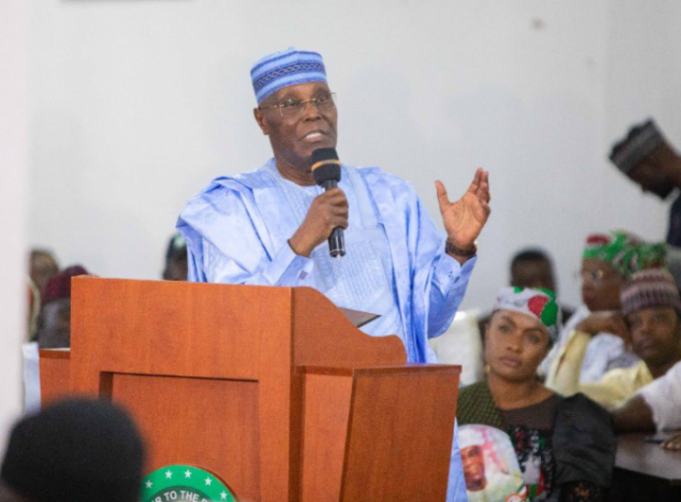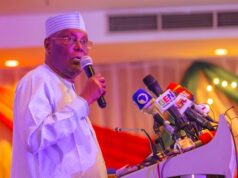The presidential candidate of the Peoples Democratic Party (PDP), Atiku Abubakar, says his administration would support the private sector to solve the economic challenges bedevilling country if elected as president in 2023.
Atiku said Nigeria cannot overcome its economic challenges without supporting the private sector to play a key role in the economy, adding that the present administration failed to demonstrate a strong commitment to private sector development.
The former Vice President said this in Lagos on Tuesday at the Lagos Chamber of Commerce and Industry (LCCI) Presidential Economic Agenda Forum for the PDP.
He said: “We cannot overcome our economic challenges without significant reforms to re-structure the economy and to support the private sector to unleash its growth potential and play a key role in the economy.
“A strong, productive, and pro-growth private sector is needed to create wealth, generate employment opportunities, and help fight poverty.
“Nigerian businesses are significantly impacted by business environment constraints and cannot therefore realise their full potentials. This government has failed to demonstrate a strong commitment to private sector development: for example, the several pledges it made to reduce its pervasive influence on the economy and promote private sector-led development remain unfulfilled.
“Our administration will be different. We will support the private sector to drive growth. We will establish strong partnership in investing in infrastructure, in creating jobs and income, and in the fight against poverty.
READ ALSO: Atiku: I’ll sell all refineries, stop subsidy if elected president
“We will listen to the private sector more. Understanding the private sector and securing their buy-in when policies are designed will determine the success of our economic growth and development agenda.
“Through regular dialogue with the private sector, we will build consensus, improve trust between us and make new reform initiatives easier to implement and sustainable,” Atiku stated.
The PDP presidential candidate added that his government would allow the Central Bank of Nigeria (CBN) the independence to pursue its mandate BUT and ensure that such policies are not detrimental to Nigeria’s quest for FDI and to Nigeria’s long-term growth.
“For example, we will push for a foreign exchange policy that encourages capital inflows and makes capital outflows less attractive to the investors.
“The government is currently driving key infrastructural programmes with very limited private sector participation. In the face of dwindling public revenues and given the quantum of resources required to bridge the financing deficit, this is neither feasible nor sustainable.
Tinubu: I work 20 hours daily meeting people, strategising
“We shall incentivise, with regulation and tax incentives, a consortium of private sector institutions to establish an Infrastructure Debt Fund [IDF] with an initial carrying capacity of US$20 billion. This will be for the financing and delivery of large infrastructure projects across all sectors of the economy,” he noted.
Atiku added that his administration would establish an ‘Infrastructure Development Unit (IDU)’ in the Presidency, “with a coordinating function and a specific mandate of working with the MDAs to fast track and drive the process of infrastructure development in the country.”
He stated that his government would consider declaring a state of emergency in the power sector to “underscore our concerns about the state of affairs in the sector”.
The former Vice President said: “As a short-term measure to ensure enhanced supply within the first year of the new administration, I shall initiate and implement an emergency power programme (EPPs) that can deliver additional capacity in certain key areas.
“Over the medium term, I will then go on to propose a legislation for the removal of the entire electricity value chain from the exclusive list and give states the power to generate, transmit and distribute electricity for themselves.
“One lesson we have learnt recently is that an industrial dispute with the FG in Abuja should not affect an industry in Lagos or a factory in Aba or in Kano or even an average Nigerian who just wants to get home, watch the news and sleep under a ceiling fan.
“Secondly, my policy shall aim at achieving greater coordination of investments in the entire electricity value chain. Investments in additional generation capacity are futile without consideration for the complementary transmission and distribution infrastructure to wheel the additional energy.
“Thirdly, ahead of procuring additional generation, both transmission and distribution capacities would be enhanced with private sector support for investments.
“In this regard, we shall incentivise private investors to invest in the development of multiple green-field mini-grid transmission systems to be looped into the super-grid in the medium to long term while allowing the FG focus on policy, regulation, and standardisation,” Atiku noted.
He, however, promised to create job opportunities in the country if elected as president, saying: “Economic growth will be meaningless unless our citizens enjoy the benefits of growth including access to jobs, higher incomes, and enhanced access to social amenities.
“Poverty reduction shall be the centrepiece of our economic development agenda and economic performance shall henceforth be measured by the number of jobs created and the number of people lifted out of poverty.”
- Premier League: Liverpool thrash Tottenham in 9-goal thriller - December 22, 2024
- EPL: Bournemouth thrash Man United at Old Trafford as Everton draw Chelsea - December 22, 2024
- ‘It’ll improve access to education’: Kaduna poly lauds Uba Sani on retirement age - December 22, 2024










